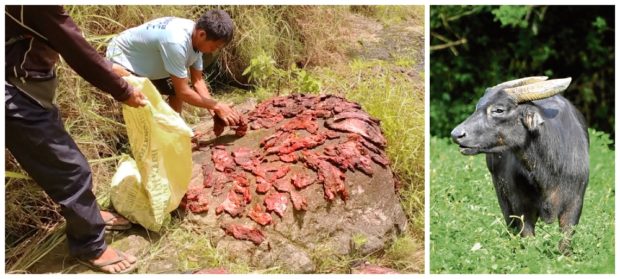Mindoro loses 2nd tamaraw to poachers in 4 months

SLAUGHTERED Forest rangers found a sack full of tamaraw meat being dried up into tapa (buffalo bush jerky) in the Mt. Iglit-Baco National Park in Occidental Mindoro province on Aug. 28. Three poachers shot and slaughtered the tamaraw, an endangered species. —GREGGYAN/CONTRIBUTOR
SAN PEDRO CITY, Laguna, Philippines — A subadult tamaraw (Bubalus mindorensis) was slaughtered by hunters in Occidental Mindoro province, the second one killed during the coronavirus disease pandemic lockdown that has seen a surge in poaching and wildlife trade.
But it was “the first time in many years” that conservationists came across hunters who were after the meat of the critically endangered animal, said Neil del Mundo, coordinator of the Department of Environment and Natural Resources’ Tamaraw Conservation Program (TCP).
Meat trade In the past, tamaraws were hunted down mainly for sport.
“We were surprised there was actually a market [for the meat]. [The hunters] also said they carried borrowed guns, which means there were more people behind them,” Del Mundo said in a phone interview on Sunday.
The last known tamaraw population in 2019 was about 600, mostly in the 106,655-hectare. Mt. Iglit-Baco National Park in the central interior of Occidental Mindoro.
Article continues after this advertisementThe TCP was not able to conduct a population survey this year because of movement restrictions due to the pandemic.
Article continues after this advertisementDel Mundo said a team of 12 unarmed forest rangers and wardens learned about the unwanted guests inside the conservation site on Aug. 26, certain that they were hunters since tourists were prohibited at this time.
After two days of trailing, authorities found 35 kilos of fresh meat being dried under the sun near the base of Magawang hill, at the boundary of Calintaan and Sablayan towns within the park. The head and intestines of the animal, believed to be around 6 years old, were already discarded.
Rangers’ supportThe rangers apprehended two male hunters but a third one managed to escape. Confiscated from them were two “pugakang,” or homemade shotguns.
The hunters told the authorities they shot the tamaraw dead for “pangkain” (food) and for trade.
Del Mundo said they did not have any idea yet how much the meat was being sold.
Sun-drying into tapa, or buffalo bush jerky, could be the hunters’ way to preserve the meat for a four-to-seven-hour trek down to the town proper of Calintaan, Del Mundo said.
As they neared the highway, the two hunters escaped and reportedly ran back into the forests. “The rangers tried to chase them but they were gone fast. Our rangers were already tired from days of patrolling the mountains,” he said.
In April, a tamaraw yearling was also shot dead by poachers.
Environmental groups and individuals have since been raising funds for the salaries of forest rangers, as they called for an increased support to the 56 tamaraw rangers and wardens patrolling the park.